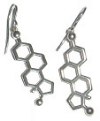Are you deaf to the risks of hearing loss from mp3 player aural satisfaction?
According to a survey published today by Deafness Research UK, more than half of 16-24 year olds listen to their MP3 player for more than an hour a day, with almost 20% using for 21 hours a week. Trouble is, 68% of them don’t realise that listening to their MP3 player at loud volume can permanently damage their hearing.
It’s not exactly a new message, as a teenager, I heard the same calls for quiet when the first wave of Walkman cassette players were around and I’m sure generations of wind-up 78 gramophone flappers were told not to put the needle on the record too often or stick their ear too close to that brass cone. It’s a sensible message though, as I am sure many a deaf middle-aged rocker will testify.
Deafness could strike mp3 users 30 years earlier than their parents, the survey says. At least compared with those parents who didn’t overdo it with their Walkmans, one must assume. The survey results are published to mark the launch of a partnership between Specsavers Hearcare and Deafness Research UK to help fund deafness research.
Apparently, 14% of people spend up to “a staggering” 28 hours a week listening to their personal music player. I’m pretty sure some people watch more TV than that and if you go clubbing for five hours three times a week and listen to music on the other days that would quickly add up to far more than any “staggering” 28 hours. More than a third of people who have experienced ringing in their ears after listening to loud music, listen to their MP3 player every day. The news release doesn’t say whether these two facts are actually connected. Every youngster has experience temporary tinnitus after a music gig that usually lasts a day and I suspect that most gig goers listen to their mp3 players fairly frequently too. It would be hard to separate the two issues. Gig tinnitus or mp3 loudness…
Vivienne Michael, Chief Executive of Deafness Research UK, says: ‘Many young people are regularly using MP3 players for long periods of time and are frighteningly unaware of the fact that loud noise can permanently damage your hearing.
‘More than three quarters of people own a personal music player and sophisticated sound systems in their car and homes, which allow them to blast out music day and night. We also spend more time today in bars and clubs where the noise is so loud we can barely hear the person opposite us and few people — particularly the 16-34 year old age group – are aware of the damaging effect all this can have on their hearing.’
This kind of quote appears to be so out of touch that it’s simply unbelievable, “we also spend more time in bars and clubs…”? Really, when I were a lad, we used to spend at least three nights a week clubbing or at gigs where “we could barely hear each other drink”. And, yes maybe it is having an effect on my hearing, but it really is nothing new and yes we used to “blast out” music from our stereos (unsophisticated or otherwise) and play electric guitars too loud and all the rest. Nothing new under the sun, madam I’m afraid.
Meanwhile, there is a serious message underpinning this Deafness press release hidden among the fogeyness: Vivienne Michael continues: ‘Hearing loss can make life unbearable. It cuts people off from their family and friends and makes everyday communication extremely difficult. We want people to realise that their hearing is as important as their sight and protect their ears against any potential damage.’
Fair enough. Stop playing it at “11” and you might just be okay. Oh, and don’t stay out too late, and remember to say please and thank you and look both ways before you cross the road…

 Precious jewelry is usually made with metals rather than molecules, although there is plenty of costume jewelry made with polymers and other materials which are of course composed of molecules. But, that’s not really a concern for madewithmolecules.com who are touting a chemically aware range of chokers, keychains, necklaces, charm bracelets, and even boxer shorts, sporting your favourite molecule.
Precious jewelry is usually made with metals rather than molecules, although there is plenty of costume jewelry made with polymers and other materials which are of course composed of molecules. But, that’s not really a concern for madewithmolecules.com who are touting a chemically aware range of chokers, keychains, necklaces, charm bracelets, and even boxer shorts, sporting your favourite molecule.